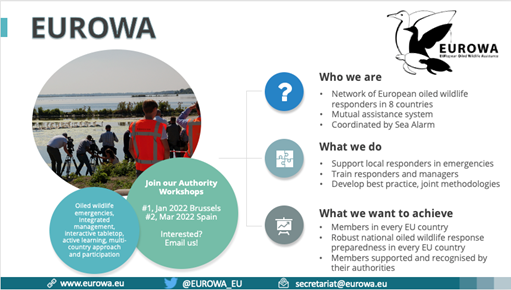EUROWA (EURopean Oiled Wildlife Assistance) is a network of European oiled wildlife response experts who are working together to improve professionalism in marine wildlife emergency response. We have been building our network of wildlife professionals for many years and with the help of EU Civil Protection funding through the EUROWA-1 and EUROWA-2 projects, our network is now solidifying.
Marine pollution events such as oil spills are rare, but they can have devastating effects on marine life, local livelihoods, and society at large. Our aim is to provide a well-disciplined, coordinated, and professional wildlife response team consisting of experts and their equipment, which can quickly be put together and sent to assist a European country that is facing a wildlife emergency.
The key to successful wildlife response is preparedness and understanding how a wildlife response is best integrated into the overall oil spill response organisation. Large-scale oil spill response operations are complex, long-lasting and logistically challenging. Wildlife responders need to have access to key decision making structures and situation awareness tools – and there must be pre-agreed structures in place to accommodate the needs of the Wildlife Branch. Therefore, we want to actively educate and involve national authorities, to increase their awareness of the risks and possible scales of wildlife emergencies and how to successfully plan and prepare for them as part of an integrated emergency management system. This will be the main focus of our two authority workshops under the EUROWA-2 project planned in January and March 2022.
For the EUROWA network to be able to respond, a national wildlife response and preparedness system must be in place, that can easily accommodate the presence of EUROWA international experts and their equipment. Ideally, there is a national oiled wildlife response plan that has made arrangements for this. To achieve a well-functioning wildlife response system, a rigid oiled national oiled wildlife response organisation should be in place, where NGOs/volunteers are involved in continued development of facilities, training and equipment – and experts should be able to keep their skills up to date. Exercise programmes should ensure that response capabilities are continually tested and improved. Training local responders to EUROWA standards ensures that providing and receiving European assistance is not only possible but seamless, and that resource use is efficient.
Our vision is for every coastal country in Europe to be well prepared for an emergency involving wildlife. Although several countries (like the Netherlands) have made great strides forward in setting up robust arrangements for wildlife response, across Europe there is still much to be done. Ultimately it is the responsibility of authorities in each country to be able to mount and coordinated an oiled wildlife response, assisted by local stakeholders and expertise from our EUROWA network. With your help we can develop a European Oiled Wildlife Assistance system that is both financially and structurally supported by authorities, professional, firmly integrated in national and European oil spill response systems and ensures the well-being of oil-affected animals and responders alike!
